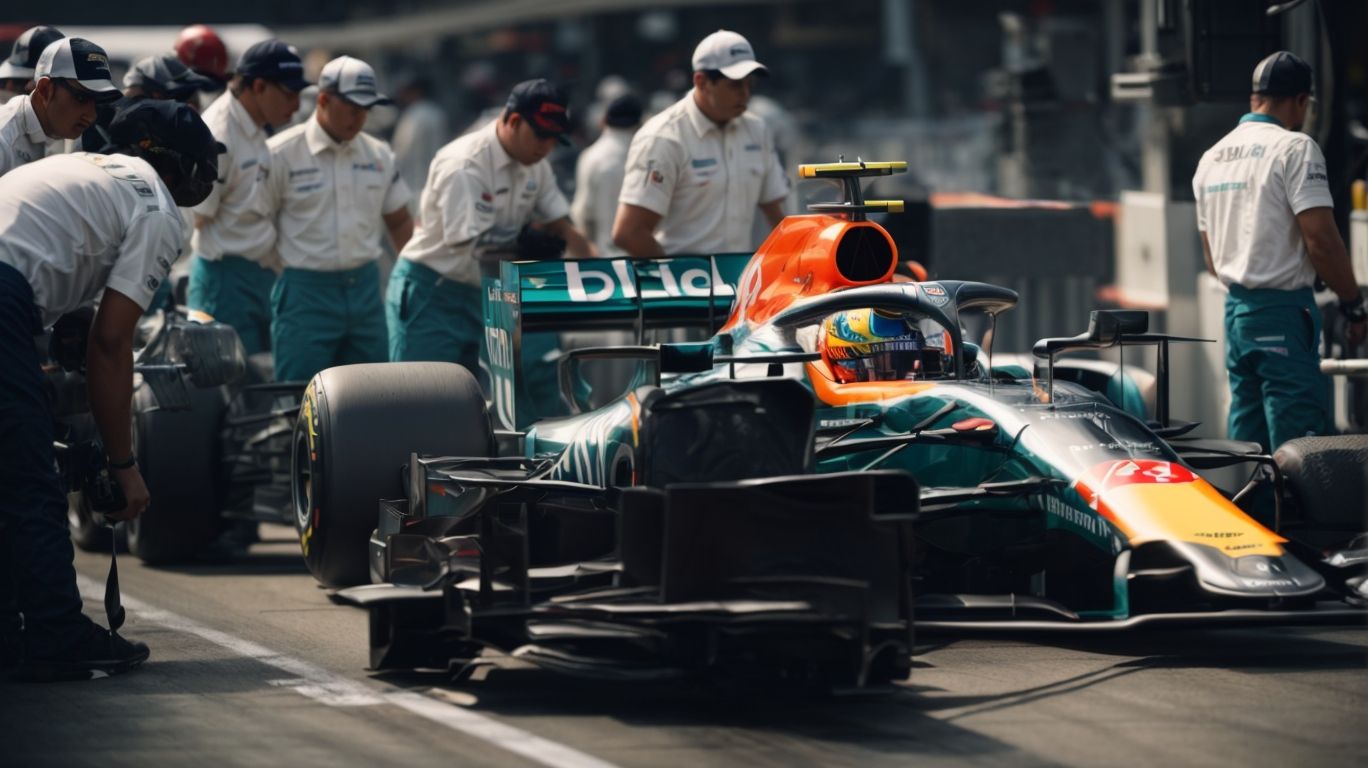Do F1 Mechanics Get Bonuses for Winning?
Have you ever wondered what it takes to be an F1 mechanic?
This article will explore the world of F1 mechanics, from the skills required to the competitive salaries and bonuses.
Find out if F1 mechanics receive bonuses for winning races and what other benefits they enjoy. Join us as we delve into the exciting world of F1 mechanics and discover the rewards and challenges that come with this high-pressure, high-speed career.
Key Takeaways:
What is the Role of an F1 Mechanic?
The role of an F1 mechanic is crucial in ensuring the smooth operation of Formula One race events by providing technical support and maintaining the performance of high-performance race cars.
F1 mechanics are responsible for meticulously preparing the race cars, ensuring that every component is finely tuned for optimal performance on the track. They work tirelessly behind the scenes, conducting intricate inspections, making adjustments, and troubleshooting any issues that may arise during testing or actual races. These skilled professionals play a pivotal role in the overall success of a racing team, as their expertise directly impacts the speed, handling, and reliability of the cars. With their profound understanding of the intricate engineering involved, F1 mechanics contribute significantly to maximizing the car’s potential and fine-tuning it to meet the demands of each unique circuit.
What Skills are Required for an F1 Mechanic?
To excel as an F1 mechanic, individuals must possess a unique blend of technical skills, extensive experience in working with high-performance vehicles, and the ability to adapt to the fast-paced environment of Formula One racing.
Technical skills are the foundation of success in the competitive world of Formula One. These professionals need to be well-versed in areas such as aerodynamics, chassis design, and engine mechanics. They must also have a deep understanding of data analysis tools and be proficient in using specialized software for vehicle diagnostics and tuning.
Having hands-on experience with race cars is crucial for developing a keen eye for detail and precision when working on the intricate components of F1 vehicles. This practical knowledge not only enhances their problem-solving abilities but also builds confidence in handling complex mechanical challenges.
Collaboration is key in the high-pressure F1 environment, where teamwork between mechanics, drivers, and engineers plays a pivotal role in achieving optimal performance. Effective communication, mutual respect, and a shared goal of achieving racing excellence are essential for seamless operations and successful outcomes in Formula One.
How Much Do F1 Mechanics Get Paid?
F1 mechanics receive competitive salaries that reflect their expertise, with earnings varying based on factors such as experience, team performance, and additional bonuses.
Payment structures for F1 mechanics are often intricately linked to their performance and seniority within the team. The more experienced mechanics typically command higher salaries, as their wealth of knowledge and skills play a crucial role in the team’s success on the track. Performance-based bonuses incentivize mechanics to work efficiently and effectively during races and pit stops, further impacting their overall earnings.
The financial health of the team also plays a significant role in determining mechanic salaries. Teams that perform well on the circuit and attract lucrative sponsorships are often able to allocate more funds towards rewarding their mechanics. This means that successful teams can offer higher salaries and bonuses to their mechanics compared to those lower down the standings.
What Factors Affect the Salary of an F1 Mechanic?
Several factors influence the salary of an F1 mechanic, including experience level, performance bonuses, overtime opportunities, and additional benefits such as health insurance and retirement plans.
Experience plays a crucial role in determining the base pay of an F1 mechanic. Mechanics with several years of experience in the fast-paced world of Formula 1 racing often command higher salaries due to their deep knowledge and expertise.
Performance bonuses are another significant aspect that affects the compensation package. These bonuses are tied to the team’s success on the track, encouraging mechanics to work diligently and efficiently to ensure top-notch performance.
The availability of overtime opportunities can substantially impact an F1 mechanic’s earnings. Races require extensive preparation and on-the-spot repairs, leading to added hours and potential overtime pay.
Plus monetary compensation, benefits like health insurance and retirement plans are crucial for attracting and retaining skilled mechanics in the competitive world of Formula 1.
Do F1 Mechanics Receive Bonuses?
F1 mechanics often receive bonuses as part of their compensation package, with incentives tied to team performance, race outcomes, and overall competition results.
One of the key elements of the bonus structure for F1 mechanics revolves around the team’s success on the track. Individual performance is crucial, but it is within the context of team achievements that these bonuses truly come to the fore. Stellar race outcomes, such as podium finishes and top rankings, directly impact the bonus payments these skilled professionals receive.
The competitive nature of Formula 1 means that each mechanic’s role is integral to the overall success of the team. Teams that consistently perform well throughout the season tend to reward their mechanics with more substantial bonuses. This creates a mutually beneficial relationship where both individual effort and team success are rewarded accordingly.
What Types of Bonuses Do F1 Mechanics Receive?
F1 mechanics receive various types of bonuses, including performance-based incentives, team achievement rewards, and individual contribution bonuses, all aimed at recognizing and motivating their exceptional work in Formula One.
Performance-based incentives are typically tied to specific goals like pit stop times, car setup improvements, or race results, encouraging mechanics to continuously strive for excellence.
Team achievement rewards are granted when the whole team achieves milestones like podium finishes or securing championships, fostering a sense of camaraderie and teamwork among the mechanics.
Individual contribution bonuses are tailored to recognize outstanding efforts that go above and beyond the standard duties of a mechanic, incentivizing innovation and dedication within the team structure.
Do F1 Mechanics Receive Bonuses for Winning Races?
Winning races in Formula One often triggers additional bonuses for F1 mechanics, recognizing their role in the team’s victory and rewarding their dedication to achieving success on the race track.
These bonus payouts serve as a motivation for mechanics to continuously fine-tune the race cars and ensure optimal performance during each Grand Prix. The financial rewards associated with winning races go beyond just the prize money for the team; they are distributed down the hierarchy to include everyone involved in the success, including the mechanics who work tirelessly behind the scenes.
- The link between team performance and bonus structures is crucial in the high-stakes world of F1, where every small improvement can make a difference on the track.
- Securing a victory not only boosts the team’s standing in the championship but also has a direct impact on the mechanics’ earnings, fostering a sense of unity and shared achievement within the team.
Do F1 Mechanics Receive Bonuses for Winning Championships?
Championship wins in Formula One often lead to substantial bonuses for F1 mechanics, acknowledging their contribution to the team’s overall success and celebrating their role in clinching prestigious titles.
Victories in the championship not only bring glory to the team but also translate into tangible financial rewards for the hard-working mechanics behind the scenes. These bonuses serve as a token of appreciation for their dedication and skill in ensuring the cars are in top condition race after race.
Team achievements play a crucial role in determining the bonus distribution among the support staff, with bonuses often increasing significantly after securing a championship. It acts as a motivator for the mechanics to push their limits and strive for excellence in their craft.
The financial incentives associated with winning championships go beyond simple monetary value; they symbolize the culmination of teamwork, perseverance, and technical expertise that go into achieving success in the highly competitive world of Formula One.
What Other Benefits Do F1 Mechanics Receive?
Plus salaries and bonuses, F1 mechanics enjoy a range of benefits, including travel opportunities, accommodations during race events, and various perks that enhance their overall income package.
Travel arrangements for F1 mechanics often include flights to different international locations, providing them with a chance to experience various cultures and landscapes around the globe.
Their accommodations during race events are meticulously organized, ensuring comfortable stays at luxury hotels or top-rated lodging facilities. These additional benefits not only contribute to the mechanics’ well-being but also enable them to focus better on their work without worrying about travel logistics or accommodation arrangements.
Do F1 Mechanics Receive Travel Benefits?
Travel benefits are a common inclusion in the compensation packages of F1 mechanics, providing them with opportunities to experience different locations during race events and ensuring their comfort and convenience throughout the season.
Accommodations for these dedicated professionals are meticulously planned, with luxurious hotels, exclusive transport services, and access to elite dining options. The focus is on creating a seamless experience, allowing mechanics to focus on their crucial work without worrying about logistics.
Do F1 Mechanics Receive Sponsorship Deals?
While sponsorship deals are more common for drivers in Formula One, some top F1 mechanics may also secure individual endorsement agreements, leveraging their expertise and performance to attract sponsorships and additional earnings.
These endorsement agreements can serve as a significant source of additional income for F1 mechanics, complementing their salaries from their teams. The visibility and reputation of a mechanic within the paddock can play a crucial role in attracting sponsors, especially for those who are known for their exceptional skills and track record.
Building strong relationships with sponsors can open up opportunities for mechanics to promote products and brands both within the racing community and to a broader audience, expanding their reach and exposure.
Conclusion
F1 mechanics play a vital role in the success of Formula One teams, receiving competitive salaries, bonuses, and various benefits that recognize their contributions to the high-stakes world of F1 racing.
The compensation for F1 mechanics goes beyond just financial rewards. They are often provided with health insurance, travel allowances, and access to exclusive events. Their expertise and hard work are acknowledged by sponsors, team owners, and the wider F1 community. This recognition not only boosts their morale but also cements their crucial position within the intricate web of the Formula One ecosystem.
Frequently Asked Questions
Do F1 Mechanics Get Bonuses for Winning?
No, F1 mechanics do not typically receive bonuses for winning races. Their salaries are typically determined by their team’s budget and their individual experience and expertise.
What kind of bonuses do F1 mechanics receive?
F1 mechanics may receive bonuses for other achievements, such as setting record lap times or helping their team win a championship. These bonuses are typically determined by the team and may vary.
Do F1 mechanics receive any incentives for their performance?
Some F1 teams may offer performance incentives to their mechanics, such as bonuses for fast pit stops or achieving a certain number of points in a race. However, these incentives are not typically tied to winning races.
Are F1 mechanics paid more if their team wins a race?
No, F1 mechanics’ salaries are not directly tied to their team’s performance in a race. They are typically paid a fixed amount based on their contract and position within the team.
Do F1 mechanics receive bonuses from their sponsors?
It is possible that F1 mechanics may receive bonuses from their team’s sponsors, but this is not a common practice. Sponsors typically focus on the drivers and the team as a whole, rather than individual mechanics.
Do F1 mechanics receive any other perks for winning races?
While they may not receive direct bonuses for winning races, F1 mechanics may receive other perks, such as special team merchandise or tickets to other sporting events. These perks are typically determined by the team and may vary.

